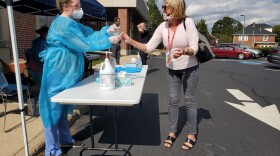Massachusetts Democrats have a lot to celebrate this election season. They preserved an all-blue congressional delegation and gained two seats in the state Legislature, where they already have veto-proof majorities in both chambers.
Yet the party may not be as unified as it will need to be for the next big challenge: winning back the governor’s office in 2022.
In a memorable moment during this year’s U.S. Senate primary between Sen. Ed Markey and Rep. Joe Kennedy, the candidates were asked, in a debate, if they would vote to give Republican Gov. Charlie Baker a third term.
“I think that depends on the field,” Kennedy replied, after initially ducking the question.
Markey said essentially the same: “Let’s see where we are in 2022.”
Two proud progressives wouldn’t say for certain that they would back the Democratic nominee for governor. Granted, it’s too early to know who the nominee might be, but that future candidate won’t automatically have support from the party’s whole team.
“Gov. Baker has maintained his popularity,” acknowledged Jay Gonzalez, the Democratic nominee for governor in 2018, “and some people are less willing to publicly criticize him.”
Gonzalez contends now, as he did two years ago, that Baker isn’t bold enough. He wants Democrats to rally around big, progressive policy ideas, like moving Massachusetts to a single-payer health care system.
“I think there’s a lot of support for it,” Gonzalez said. “It’s a complicated issue. This is where, from my perspective, I think it’s really important that we, as Democrats, put candidates forward and leaders forward who are going to make the case for this.”
But so far, single-payer health care isn’t a proven winner, even in blue Massachusetts. Gonzalez ran on it and lost. And in the state’s Democratic presidential primary this year, Sens. Elizabeth Warren and Bernie Sanders campaigned on “Medicare for All” and finished behind Joe Biden.
Biden went on to win the presidency while pitching something more moderate: a public option for the Affordable Care Act.
“Whether single-payer health care should be one of the top three policy positions advanced by the party, I’m not sure,” said Tanisha Sullivan, president of the NAACP Boston branch.
“I do think bread and butter is focusing on jobs,” she added, saying that confronting economic inequality should be a high priority. “We have the jobs here. What we haven’t had are policies and programs that have been effective in helping to prepare the residents of the commonwealth to transition into those jobs.”
Democrats can push multiple agenda items at once, said Massachusetts Democratic Party Chairman Gus Bickford. He is quick to mention climate change as another major issue.
But single-payer health care has a special allure because Bickford sees an opportunity to lead the nation.
“I absolutely think we should be ambitious, and I think that we can be the example for what the country can do in future years,” he said. “If we’re able to develop a system that’s equitable, we can be the test pod for the single-payer [system], so people can see that it absolutely works.”
While Bickford works to convince voters, he also is trying to make amends with some Democratic activists. An investigation commissioned by the state party concluded that he improperly interfered in this year’s congressional primary between Rep. Richard Neal and Holyoke Mayor Alex Morse. Bickford offered guidance to a UMass student group that accused Morse, who is gay, of inappropriate sexual interactions with students.
Morse has vehemently denied any wrongdoing. UMass is still probing Morse’s actions, but some Democrats hold Bickford partly responsible for injecting homophobia into the race.
“I don’t believe that the stirring up of homophobic tropes was intentional, but it was definitely a side effect, and it does do harm to the community, even if it wasn’t the intent,” said Tanya Neslusan, executive director of MassEquality, an LGBTQ advocacy group.
Neslusan is a member of the Democratic Party’s state committee, and she voted against giving Bickford another four-year term as chairman last week. Bickford drew a couple of challengers but did win reelection.
Neslusan thinks there is time for Democrats to come together before the upcoming governor’s race.
“We just need to make sure that we have a really strong candidate who is well-positioned and likeable and has what it takes to win,” she said.
Baker hasn’t confirmed he will run again. Many of the people hoping he will may be Democrats. Almost three-quarters of Democrats in a WBUR poll over the summer said they have a favorable view of the Republican incumbent.
This article was originally published on WBUR.org.
Copyright 2020 WBUR






